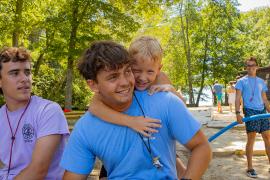We love to talk about resiliency and grit in the camp industry, and as this difficult year comes to a close, our entire industry is living those values in real time as we attempt to dust ourselves off and prepare for what 2021 may bring. If there’s any group of people who can adapt on the fly and come up with creative solutions, it’s camp professionals. While our focus is already trained on the upcoming summer, the off-season is an important time to also reflect on what was and how that may shape what will be. As we continue to adjust to the COVID-19 world and the new challenges (and opportunities) it presents, one issue, in particular, warrants our attention — our current inability to connect with one another, and the impact that’s having on various issues created by increased social isolation and loneliness.
Framing the Issue
The subject of loneliness was receiving attention before the pandemic consumed our daily narrative. Research on its prevalence and health effects, both mental and physical, has even prompted some governments to begin implementing nationwide programs to combat this burgeoning problem. In recent years, for instance, both the United Kingdom and Australia have appointed national “Ministers for Loneliness.” This topic was even highlighted as a critical issue for youth development this past winter at the 2020 ACA National and ACA, New England Camp Conferences (Arizala & Claman, 2020).
There are some conflicting reports on the effects the pandemic has had on loneliness in the United States, but even if things haven’t gotten worse, they were already in rough shape. Recent studies have shown that anywhere from 30 percent to 60 percent of Americans self-identify as lonely, with individuals ages 14 to 24 of particular concern as loneliness was previously considered primarily an eldercare issue (Cigna, 2020; Salkin, 2016; Yeh, 2017). But while many of the statistics surrounding the loneliness epidemic are staggering and noteworthy, particularly during these trying times, our focus as camp professionals should be on a proactive, solution-oriented approach to help our campers and staff learn the skills needed to distinguish between being alone and feeling lonely — and how to intentionally combat loneliness when it arises.
Camp professionals often emphasize a number of 21st-century skills with their campers. However, as we head into a new year with so many unknowns still in front of us, no skill may be more important than learning how to intentionally have meaningful conversations about uncomfortable topics. We must strive to normalize, destigmatize, and empathize with concepts such as “feeling lonely,” an experience we ultimately can all relate to in some form or another.
Expanding the Issue
That all being said, 2020 was about more than just a virus, and the issues we’re facing as a society are about more than just loneliness. Several crucial issues have finally emerged on a national scale that our campers are going to be on the frontlines of in the very near future — if they aren’t already. Systemic racism, inequity, and inequality, or even the simple debate over whether to wear a mask (please, wear a mask), are topics now being shared with children of all ages. Camps are going to play a major role in facilitating intentional conversations within our respective communities. What better place to speak of acceptance and inclusion than at camp, where so many of us incorporate those mindsets as major tenets of our program and philosophy?
With that in mind, and understanding that one of the key combatants in the fight against loneliness is forming and maintaining meaningful (even if only casual) connections, we would be wise to tackle a broader issue. How can we, as camp leaders, foster environments where our campers and staff can have intentional, meaningful conversations about topics that help them engage with one another in a more purposeful way; conversations that also hone skills that enable them to achieve deeper levels of trust, connection, and empathy with their peers?
Kalina Silverman, founder of Big Talk (a social experiment and video series promoting thoughtful interaction and connection beyond the superficial) and facilitator of more meaningful conversations to form deeper connections, says, “Skip the small talk” in the pursuit of establishing empathy across cultures. While much of her work has been focused on adults and adult audiences, the concepts behind building relationships through intentional conversation have real implications for youth development and can easily be adopted at camp. Imagine having dining hall “table topics” during staff orientation that help staff connect with one another in a way that promotes empathy. Or providing your counselors with a how-to guide for their first “bunk talk,” helping them get to know their campers on a deeper level from day one. Numerous applications for Big Talk’s methodology exist in the camp environment, as do many adaptations that you can implement even before camp starts this summer, including with your year-round team.
About Big Talk: A Brief Interview
Kalina Silverman, Fulbright Scholar and founder of Big Talk, shares some of her wisdom with regard to using intentional conversations to promote empathy.
Claman: What does it mean to have intentional, deep conversations, or “Big Talk” as you’ve coined it?
Silverman: It is all about skipping the small talk to ask deeper questions and make more meaningful life connections instead. It helps us connect with one another beneath the surface, which is where real trust, empathy, and care can be established.
Claman: How do you create these intentionally big conversations?
Silverman: Choose a question that is universal (anyone can answer it regardless of age, race, socioeconomic background, geography, etc.), open-ended (not just a yes or no question), and meaningful (skips small talk and reveals a personal story)
Claman: Can you give me examples of some of your favorite conversation prompts?
Silverman: Sure! Here are five:
- Tell me about something you’ve been curious about lately.
- What has been your favorite age so far, and why?
- Where do you find peace, or what do you do to bring yourself peace?
- What is your next great adventure?
- What do you daydream about?
Claman: How do you think camps can benefit from creating a community filled with intentional, meaningful conversations?
Silverman: Camp leadership would benefit from establishing more open communication and trust, which leads to better teamwork. For camp programs specifically, the benefits of open communication, deeper connections and empathy, and trust are crucial to building a stronger and more resilient community.
For more information on Kalina Silverman and Big Talk, visit makebigtalk.com
Ways to Implement This Kind of Programming at Camp
One way or another, camp will happen in 2021. No matter which form it takes, reestablishing the culture of camp is going to be a critical step in a return to some version of “normal.” While this may look different for each camp as the summer approaches, there are two key areas where camps can make an effort to implement the use of intentional conversations to form deeper connections within their communities.
With Staff
- At your next leadership meeting with your year-round team, try incorporating some intentional conversation into your teambuilding activities. Try pushing the envelope on topics not just pertaining to each other, but also to your camp’s traditions, legacy programs, and other program elements that might benefit from more thorough questioning.
- Asking deep questions is a great way to get a better sense of prospective staff during an interview. Using targeted, behavior-based questions that align with your camp’s core values will provide you with a much clearer picture of whether someone is a good fit for your community.
- Staff orientation is an ideal time to let your staff have deeper conversations with one another — and an even better time for you and your leadership team to role model having those conversations with them! Allowing staff to be vulnerable with one another can provide valuable insight into how they will work together, and how effectively they’ll be able to empathize and relate to the various ages and stages of campers you serve.
- Likewise, giving staff a chance to participate in facilitated conversations on a deeper level is great practice for when they will do so with their campers, whether it’s planned or organic.
Doing each (or any) of these things can help set a high bar for staff when it comes to their capacity and need to open up at camp, helping to set the tone for the entire summer before it even begins.
With Campers
While campers will inherently benefit from the trickle-down effect of implementing this sort of culture with staff, more direct prompts can be used to actively promote both group and one-on-one discussion. These prompts fall under four different topics, each of which are intrinsic parts of the camp experience:
- Building Strong Relationships — Example: “How many friends could you turn to if you had a real problem?”
- Helping and Supporting Others — “When was a time you put someone else’s needs ahead of your own?”
- Practicing Gratitude — “What is something that happened today/yesterday that you’re grateful for?”
- Staying Young at Heart — “What’s something you used to love to do that you don’t do anymore? Why did you stop?”
If you make a point of routinizing conversations about these topics, you will give your campers a chance to express themselves in previously unfound ways, share meaningful things with their peers, and provide them with a platform to continue such conversations with each other. They may be more likely to open up about other things on their minds as well.
How Camps Are Already Helping
Much of what we already do at camp helps prepare children and young adults for the “real world,” or at least what the real world was before COVID-19. As the times change, so must we all. The passion, dedication, and perseverance camps have displayed throughout 2020 has been awe inspiring. Many camps have demonstrated incredible levels of innovation, ranging from high-quality remote programming to “camps-in-a-box,” virtual support networks, and so much more. While the events of the past nine months have created a whole host of new challenges for camps to adapt to, they have also expanded our ability to connect and engage with our respective communities like never before — at a time when it matters more than ever. Though many of us are struggling from some form of “Zoom fatigue” while continuing to navigate the ebbs and flows of quarantine, a growing number of camps are relishing their newfound ability to engage with their families and staff during the off-season. It is critical to maintain that momentum as 2021 approaches, as there will be a lot to unpack once the summer begins. Virtual and remote programming may be here to stay, so the ability to continue to develop new and dynamic ways to engage with your camp community is crucial. Of equal importance is to do so without losing the connections and community that make your camp so special.
Moving Forward, Together
As the calendar turns over and you begin to ramp up for Summer 2021, be mindful of the conversations you’re having, and be intentional about diving beyond the surface to address more meaningful topics. As you plan and evaluate your program for the summer, be sure to do the same with your leadership team, your staff, and maybe even your camp families. Doing so can lay a strong foundation built on sharing and open communication, fostering an environment that allows campers to hone their craft when it comes to having deeper and more meaningful (even if a little uncomfortable) conversations. This is a critical life skill they will be able to take home with them after the summer and beyond.
References
- Arizala, S. & Claman, M. (2020). Loneliness vs. being alone: How camp can help fight an epidemic. In-person presentation at ACA National Conference, San Diego, CA.
- Cigna. (2020). Loneliness is at epidemic levels in America. Retrieved from cigna.com/about-us/newsroom/studies-and-reports/combatting-loneliness/
- Salkin, W. S. (2016, October 14). Loneliness as epidemic. Bill of Health, Petrie-Flom Center, Harvard Law School. Retrieved from https://blog.petrieflom.law.harvard.edu/about/
- Yeh, C. S. (2017, January 13). The power and prevalence of loneliness. Harvard Health Publishing. Retrieved from health.harvard.edu/blog/the-power-and-prevalence-of-loneliness-2017011310977
Max Claman is a former camp director and executive now working as a camp and educational consultant.
Kalina Silverman is the founder of Big Talk (makebigtalk.com), a Fulbright Scholar, and an expert on how intentional conversations promote empathy.




